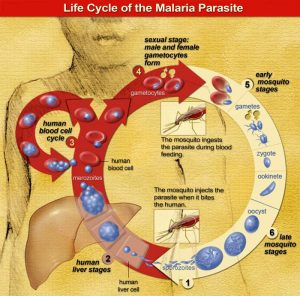USF researcher’s malaria discovery on their explosive growth
A University of South Florida professor and his team of researchers have become the first to uncover part of the mysterious process by which malaria-related parasites spread at explosive and deadly rates inside humans and other animals.

Malaria life cycle/CDC
As drug-resistant malaria threatens to become a major public health crisis, the findings could potentially lead to a powerful new treatment for malaria-caused illnesses that kill more than 600,000 people a year.
In a study published online March 3 in the high-impact journal PLOS Biology, the USF researchers and their colleagues at the University of Georgia discovered how these ancient parasites manage to replicate their chromosomes up to thousands of times before spinning off into daughter cells with perfect similitude - all the while avoiding cell death.
"How these parasites preserve fidelity in this seemingly chaotic process is one of the great mysteries of this pathogen family," said USF Health's Michael White, PhD, a professor in the College of Public Health's Department of Global Health and Morsani College of Medicine's Department of Molecular Medicine. Dr. White partnered on the study with fellow USF researcher Elena Suvorova, PhD, in the Departments of Molecular Medicine & Global Health and the Florida Center for Drug Discovery and Innovation, as well as with two researchers from the University of Georgia.
Read the rest of the USF news release HERE